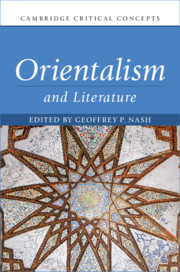Book contents
- Orientalism and Literature
- Cambridge Critical Concepts
- Orientalism and Literature
- Copyright page
- Contents
- Contributors
- Acknowledgments
- Introduction
- Part 1 Origins
- Chapter 1 Styles of Orientalism in the Eighteenth Century
- Chapter 2 The Origin and Development of the Oriental Tale
- Chapter 3 Romantic Orientalism and Occidentalism
- Chapter 4 The Victorians: Empire and the East
- Chapter 5 Orientalism and Victorian Fiction
- Chapter 6 Orientalism and Race: Aryans and Semites
- Chapter 7 Orientalism and the Bible
- Part II Development
- Part III Application
- Further Reading
- Index
Chapter 7 - Orientalism and the Bible
from Part 1 - Origins
Published online by Cambridge University Press: 01 November 2019
- Orientalism and Literature
- Cambridge Critical Concepts
- Orientalism and Literature
- Copyright page
- Contents
- Contributors
- Acknowledgments
- Introduction
- Part 1 Origins
- Chapter 1 Styles of Orientalism in the Eighteenth Century
- Chapter 2 The Origin and Development of the Oriental Tale
- Chapter 3 Romantic Orientalism and Occidentalism
- Chapter 4 The Victorians: Empire and the East
- Chapter 5 Orientalism and Victorian Fiction
- Chapter 6 Orientalism and Race: Aryans and Semites
- Chapter 7 Orientalism and the Bible
- Part II Development
- Part III Application
- Further Reading
- Index
Summary
It has become something of a cliché that the “western discourse” that Edward W. Said labeled “orientalism,”1 which included scholarship about an area labeled the “Orient,” regarded the Orient as the West’s “Other.” However, it was a crucial fact for both scholarly and popular Orientalism that the Orient contained the homeland of the Bible. This was because the Bible is the defining document of Christianity, and Christianity the defining document of the West. Hence the Orient was regarded as much as the Mother as the Other by Orientalists in the nineteenth century, which saw the spectacular rise of biblical philology, a discipline that regarded the Bible as an Oriental document: the product of the Oriental mind. The very concept of an Oriental mind, in fact, owed its modern essence to biblical philology.
- Type
- Chapter
- Information
- Orientalism and Literature , pp. 133 - 148Publisher: Cambridge University PressPrint publication year: 2019

